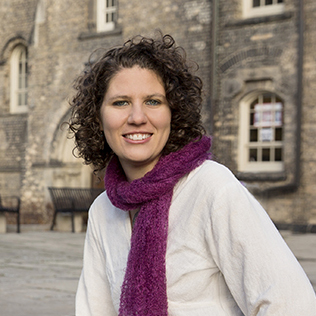Vardit Lightstone

Vardit Lightstone
JEP PhD Candidate, Germanic Languages and Literatures
University of Toronto (lead) / Hebrew University of Jerusalem (collaborator)
“I hope to work with others to help understand the complicated ways people relate to, discuss, and interact with their families' migrant pasts.”
My PhD is a Joint Educational Placement (JEP) program, with the University of Toronto (where I did my undergraduate in Celtic Studies and Jewish Studies) as my lead institution and the Hebrew University of Jerusalem (where I earned my MA in Folklore and Folk Culture) as my collaborator institution. At the University of Toronto I am enrolled in the Department of Germanic Languages and Literatures‘ new Yiddish field PhD and the Collaborative Specialization in Jewish Studies. At Hebrew University I am enrolled in the Folklore and Folk Culture Program. Thus, I am part of three academic communities, working with excellent professors as well as colleagues in all of them.
For my PhD, I am following my interest in the connection between minority languages, identity, and personal narratives. We tell ourselves, and others, stories of our lives all the time, whether anecdotes about our career paths, or a personal history when meeting someone new. I am particularly interested in the ways individual and communal identities are expressed in personal narratives. I am exploring the life stories of Yiddish-speaking immigrants who moved from Eastern Europe to Canada, and how immigrants’ descriptions of their new home reveal their assumptions of how societies should operate.
The key to putting this program in place was having two advisors, Anna Shternshis at U of T and Dani Schrire at Hebrew U, who supported not only my research ideas but also my vision of this program. The JEP enables me to work closely with experts in the fields of Yiddish culture, Jewish folklore, oral history, migration, Canadian history, etc., and to have access to the wide variety of resources I need: Canadian archives, various Jewish archives, and two extensive library networks. I also participate in activities that each institution provides for their graduate students: colloquia, fellowships, professionalization opportunities, and so on. Toronto is a vibrant city, and a lot of that vibrancy is felt in the University. The University houses a number of important institutions which host exciting events and speakers. A highlight of being here is attending these events, hearing experts in various fields from all over the world talk about their research, and participating in discussions about current scholarship.
Once I complete my PhD, I plan on continuing my research in personal narratives, migrant experiences, and minority languages, and teaching. But I also hope to take my work beyond the university. I hope to make Yiddish language material accessible to the descendants of Yiddish speakers, most of whom do not speak the language, as well as work with others to help understand the complicated ways people relate to, discuss, and interact with their families’ migrant pasts.
